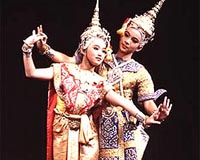Royal displeasure shows anything-goes Thailand the limits of undercovered dancing
Even in a country where scantily clad dancers are something of a national icon, there is such a thing as crossing the line.

A comment by Thailand's revered royal family has set off a campaign against one particular type of dancer, known here as Coyote Girls, after the 2000 American film "Coyote Ugly," about a group of sassy 20-somethings who dance seductively on a New York City bar top.
The movie inspired mainstream Bangkok nightclubs to feature their own brand of Coyote Girls. Soon they were dancing at auto shows. Shopping malls and businesses hired them to promote new products, and their sexy dancing became a regular feature of outdoor festivals. A troupe even entertained soldiers manning their tanks in Bangkok on a September afternoon after the military staged a coup.
But Queen Sirikit intervened after a recent performance near a Buddhist temple, on one of the religion's holiest days, prompting a crackdown that has turned Coyote Girls into a subject of national debate and official disapproval.
"Coyote Girls have to be in the right place, like an animal has to be in the zoo," said Ladda Thungsupachai, director of the Culture Watch Center, a division of the Culture Ministry, which wants to restrict the dancing to nightclubs and bars.
The problem started in mid-October when a temple in the northeastern province of Nong Khai held a festival marking the end of Buddhist Lent, a three-month period when Buddhists try to refrain from indulgence. TV news reports showed footage from a nearby motorcycle shop that had hired a group of Coyote Girls to promote its wares.
The queen saw the broadcast and was not pleased. Her private secretary wrote to the Culture Ministry to convey the queen's feeling that such performances on holy days, in a majority Buddhist country, were "inappropriate."
The Culture Ministry launched a moral crusade, the latest effort to balance the country's look-the-other-way tolerance with Buddhist values of modesty and manners.
Coyote Girls are now banned from dancing in public places, particularly near Buddhist temples, and more measures are in the works.
By and large, the dancers wear enough clothing to avoid being X-rated, and Parichart Niyomthai, a 24-year-old Coyote Girl, doesn't see her job as a moral dilemma.
Slim, attractive Parichart, who also calls herself "Natalie," is a college student by day, pursuing a double major in law and English with a minor in hotel management. On evenings and weekends, she slips into stilettos, hot pants and midriff-baring tops for a few hours of dancing that brings in a hefty 70,000 baht (US$2,000; Ђ1,500) a month.
"I pay my tuition, my car and my room," said Parichart, who has danced at auto shows and shopping malls to launch new products such as computer printers and coffee creamers and spends most nights dancing on the bar top at Forte, a Bangkok nightclub where most of the employees are female students.
She agrees that Coyote Girls shouldn't appear at Buddhist temples, but doesn't support the wider crackdown. "Coyote dancing is not prostitution," she said. "We don't sell ourselves. And we make a lot of money."
But Ladda fears the young women are making themselves vulnerable to sex crimes, and highlights an Education Ministry initiative to offer them more respectable jobs.
Subscribe to Pravda.Ru Telegram channel, Facebook, RSS!


